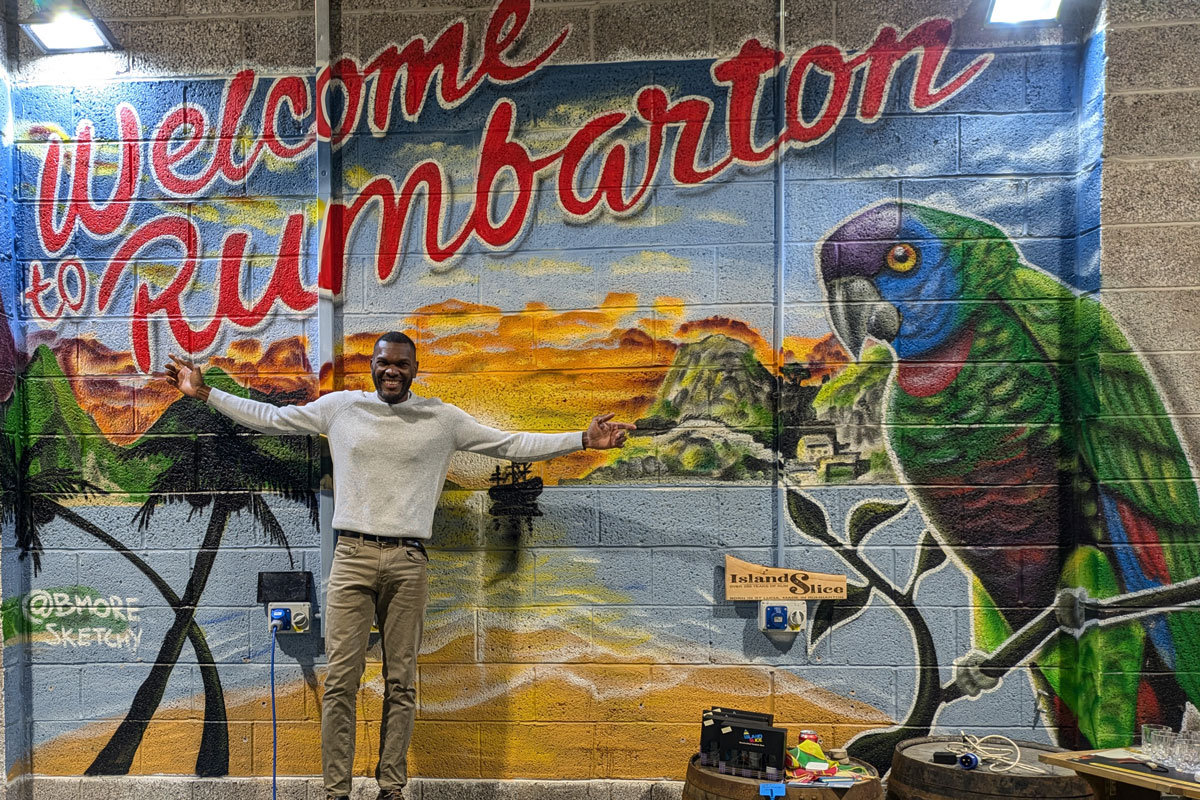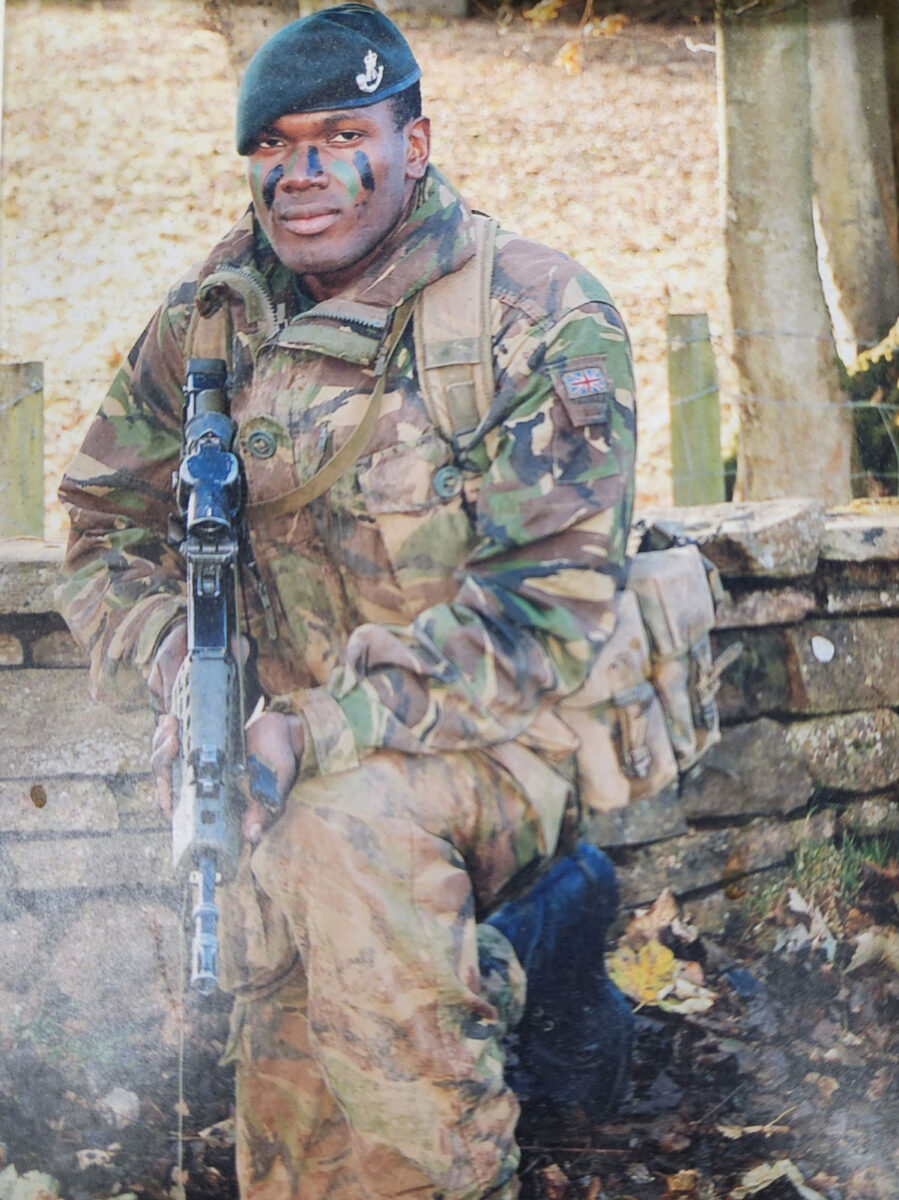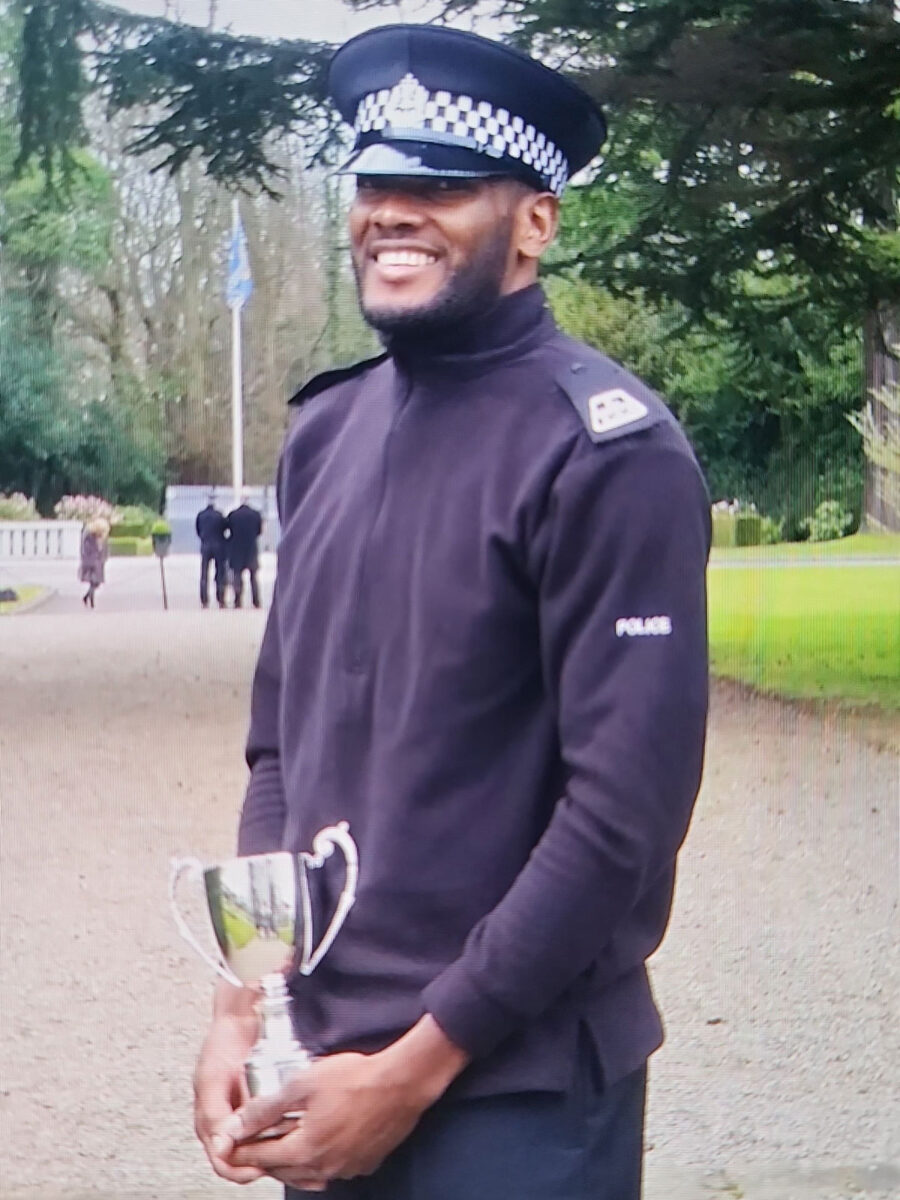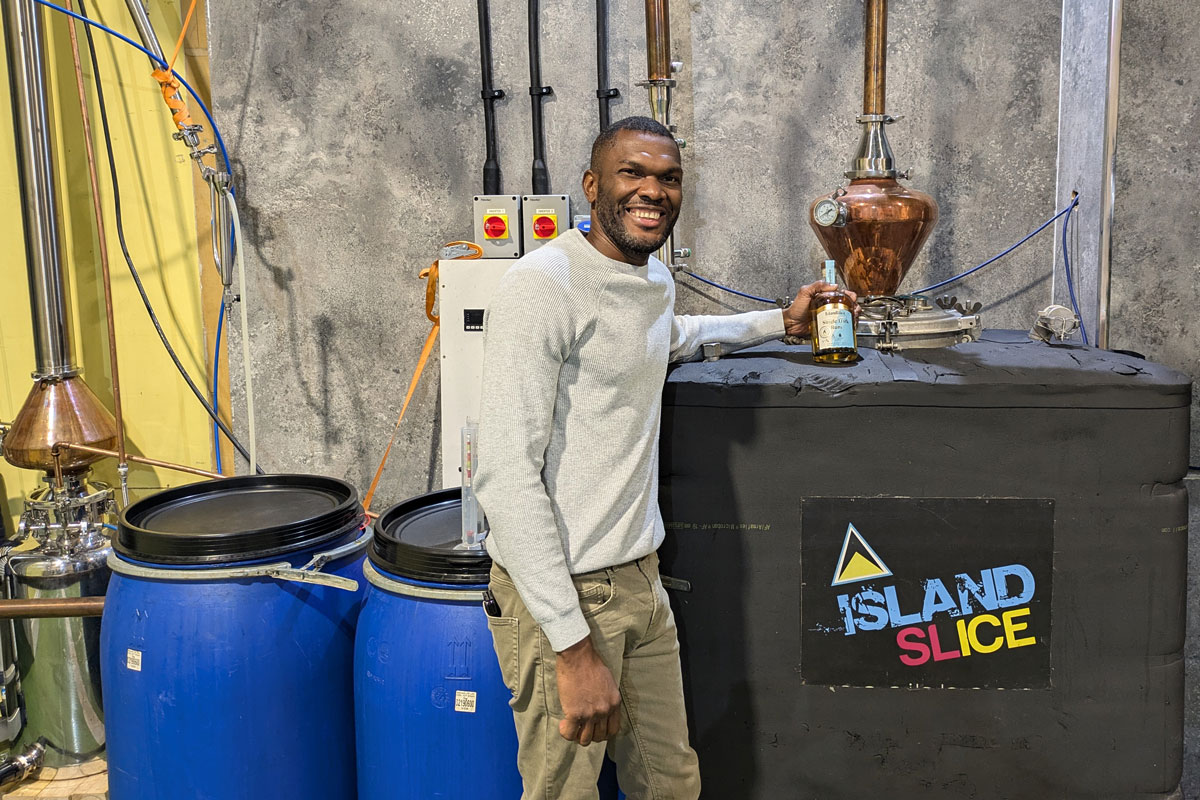
By Dave Hunter
Sylvester Herman, founder of Dumbarton rum producer Island Slice, might just be the most interesting person in the Scottish drinks industry.
Hailing originally from St Lucia and coming to Scotland by way of New York, Germany, Iraq and Afghanistan, Sylvester is a fourth-generation distiller producing a range of hand-crafted rums in a small industrial unit in Dumbarton.
How did a St Lucian come to craft small-batch rums in Dumbarton? Buckle up, folks. That’s quite the story.
Born in St Lucia, Sylvester was 13 before he lived in a house with running water and electricity. From an early age his father taught him about rum – the history of the spirit, being distilled by African slaves on the plantations, and how to make it.
At 17, having graduated high school, his mum – worried for her ‘troublesome’ son and unaware that he’d actually been offered an engineering scholarship – bought him a ticket to New York to stay with family.
In the years that followed he sold beauty products, got caught up in a pyramid scheme and spent several days homeless.
“Circumstances made me who I am, whether positive or negative”
“Circumstances made me who I am, whether positive or negative,” Sylvester told SLTN last month.
In 2004, with post-9/11 patriotism gripping the US, Sylvester’s then-girlfriend signed up for the military and relocated to Germany. Knowing he couldn’t join her unless they were married, they quickly tied the knot.
In Germany, he found work sourcing supplies for US military bases. A chance meeting with a wine importer led to him specialising in providing wines to US bases across Europe.
A few years later, with a food truck business not going nearly as well as the wine trade, and with a marriage disintegrating, Sylvester decided to take a two-week trip to the UK to clear his head. It was his first time in Britain.
Wandering around London as a tourist, he found himself popping into an army recruitment office.
“In American military bases there’d be the odd British soldier walking through the camp and everybody would stop and just stare at that soldier,” recalled Sylvester.
“They were admired. They had that personality of the professional soldier.”

After years of good living, Sylvester fancied an adventure. And, learning he was a Commonwealth citizen, the recruiters signed him up on the spot.
“I left everything behind. Just walked away,” he said. “Told everybody bye, told the guy I was in business with, ‘that’s it. I’m gone’.”
Adventure, it turned out, was not long in coming.
“I was in Germany on the Monday. Reported to my base. They gave me prior warning that my battalion was already half deployed to Iraq, so most likely you’re going to be deployed to Iraq.
“I showed up and they were like ‘welcome, guys, but we need to get ready. We’re going to Iraq’.”
“I showed up and they were like ‘welcome, guys, but we need to get ready. We’re going to Iraq’.”
It’s hard for a dedicated civilian such as a trade journalist to get their head around the mentality required to be on active deployment in a warzone, but Sylvester speaks about his time in Iraq and Afghanistan in a matter-of-fact way. As if he’s talking about an office job and not one of the most dangerous occupations on the planet.
For example: “When you’re doing a patrol, I find it safer knowing that you’re going to get attacked by the enemy, you’re going to get blown up by an IED. This is what’s going to happen to you.
“When you’re in camp, and you’re sleeping, and the mortar siren goes and you hear the phalanx gun go on the Warthog… What goes up must come down and so you hear them landing in random places and all of a sudden you hear the boom of the mortar they couldn’t stop, right next to you. And that could happen at any time, at any moment. When you’re sleeping, when you’re having lunch.
“But when you’re out there in the villages you’re expecting that. So you’re always ready for an explosion or an attack.”

As if that wasn’t enough, Sylvester was soon recruited to a taskforce that would be responsible for transporting people out of incredibly dangerous situations at short notice.
“We’d get the call, jump in the back of a Warrior vehicle, and whether it was dropping off or picking up somebody, just in, out. And we did that almost every night, or sometimes during the day. We’d hear of an attack happening and all of a sudden we’d get the call ‘we’re looking for this and this person, go get them, pick them up’. It was very dangerous. Quite a few things happened but that’s a different story for a different time.
“I enjoyed that. That was really good.”
It’s safe to say Sylvester largely enjoyed his time in the military. However, by the time he’d finished his second deployment in Afghanistan he began to feel like his ‘luck was running out’. And by then, he’d met a Scottish woman while on holiday in Crete.
Before long, his original six-year plan to exit the military and do something else became truncated.
“What I found is that those six years turned into six months,” he said.
Leaving the military and moving to Dumbarton, Sylvester joined Police Scotland.

For a while, it seemed like the story was over. Then, in St Lucia, tragedy struck.
“My dad passed away and it wasn’t that I couldn’t go to the funeral; I chose not to go to the funeral,” said Sylvester.
“I don’t do regrets. Regrets are not a thing in my book. But that’s the closest I ever came to regret in my life, was not going to my dad’s funeral.
“The reason I didn’t go was, in the infantry, I went to a lot of funerals. A lot of funerals. These were funerals of people I lived with. These people were family to me. And now I was a civilian I couldn’t do another funeral.”
The death hit Sylvester hard, made worse by his decision not to attend the funeral.
“We always say about soldiers having depression, and that’s the point I knew that mentally I was fucked. I was done”
He explained: “We always say about soldiers having depression, and that’s the point I knew that mentally I was fucked. I was done. The night of the funeral and the following night I was so broken.
“At that point I realised I shouldn’t go to work and so I didn’t go to work for two days. But what I used those two days to do was to write everything that I know about my dad, and everything he taught me. That’s how I coped with it and kept myself from going into full-on depression.”
When he was finished, Sylvester’s wife looked over what he’d written and encouraged him to do something with all that knowledge. He registered Island Slice as a company in January 2016.
But distillation was still a way away. Initially, Sylvester bought rums from supermarket shelves, blended and spiced them, and then bottled his own RTD rum punch cocktails.
His first experience of selling them came at a market event at Lomond Shores. He arrived with 250 bottles to last him the weekend. By 2pm on the first day he’d sold out.
He rushed home to make more, arriving the second day with 500 bottles. Again, they sold out. On the third day he sold a further 300 and secured a stockist.
And that’s when things got complicated.
Realising there was a market for his product, Sylvester investigated buying rums in bulk. A Dutch importer quoted him a fair price, which then multiplied when Duty was added.
Confused, Sylvester called HMRC for clarification.
“They said, ‘yes that’s our duty. However, you’re doing what? Where?!’” Recalled Sylvester.
A novice in the UK drinks industry, the budding entrepreneur had been making and selling his products without any of the requisite licences.
Oops.
Again, that could have been the end of the Island Slice story, but the HMRC representative Sylvester was dealing with was full of praise for his product and his business plan. He quickly helped Sylvester apply for and acquire everything he needed to make Island Slice above board.
And then he dropped a bombshell.
“He read the business plan and he’s like ‘why are you buying rum?’ Based on your description of how to distil you have a more (knowledge) than most people out there. You need to consider what you’re actually doing.”
A distilling licence followed, with Sylvester crafting his first still from the guts of an immersion heater. And Island Slice was on its way.

A short time later, with Sylvester having left Police Scotland, he met a local businessman who set him up with a disused industrial unit and invested in the business. New, higher-volume stills were acquired, as well as casks from various Scotch whisky distilleries.
In 2024, Sylvester is producing a core range of four rums using a combination of column and pot still distillation. He ferments his molasses using a traditional Caribbean-style ‘muck and dunder’ system, which ferments by adding yeast and leaving it open to the air.
There’s a Spiced Rum, White Rum, Dark Rum and his biggest seller to date – his Scotch Bonnet Rum.
Produced by extracting flavour from the famous chilli pepper – which is native to the Caribbean – the Scotch Bonnet rum manages to balance fruitiness with a slight heat from its famous ingredient.
And while Sylvester was full of praise for other Scottish rum producers including Matugga, Ninefold and Dark Matter, he reckons his ancestry and story help to make his product unique.
He is quick to point to the source of his rum knowledge: the enslaved Africans who first developed rum, and who passed that knowledge down generation to generation.
“Nobody is celebrating the contribution of the slaves to the production of rum.”
“Nobody is celebrating the contribution of the slaves to the production of rum,” said Sylvester.
“They go down the navy route, they go down different routes. They always find a different route to go down apart from the truth of where rum originally came from.
“They say ‘it was made on the plantation by the plantation workers’. They don’t say ‘enslaved Africans’. They say plantation workers.”
The earliest Caribbean rums, explained Sylvester, came from enslaved Africans mixing molasses – a byproduct of sugar production – with water and drinking it for energy. However, once mixed, the molasses would start to naturally ferment due to the yeast strains in the air. Depending on the strain of yeast, this could make the drinkers quite ill. And so they began distilling it, initially using homemade gourds and bamboo, heated over an open flame.
Eventually, the plantation owners got wise to what was being produced on their property and realised this was another product they could sell along with their sugar, tobacco and other goods.
It’s a unique heritage, with Sylvester both proudly St Lucian and Scottish. Earlier this year the St Lucia High Commission tasked Sylvester with creating a rum to mark the 45th anniversary of St Lucia’s independence.
But it’s the Scottish population he has his sights set on. And the on-trade is a vital part of the plan.
This year Sylvester recruited on-trade veteran ‘Uncle’ Bob Taylor to help him grow his footprint in Scotland’s bars and pubs. And he hopes Scotland will embrace the Island Slice rums, much as it has embraced their founder.
“I call it the Irn-Bru approach,” said Sylvester.
“If the Scottish people support you and you have the backing of the Scottish on-trade, no matter where you go, if your bottle is on the shelf, that’s what people are going to ask for.”
“If the Scottish people support you and you have the backing of the Scottish on-trade, no matter where you go, if your bottle is on the shelf, that’s what people are going to ask for. That’s what Irn-Bru did. It didn’t just automatically happen. They made a good product that Scotland appreciated as theirs.
“That’s what I want to do – canvas everywhere, make sure everybody knows the story, knows the brand, knows everything behind it, and they feel a part of it.
Now, as he prepares to expand his production in ‘Rumbarton’, Sylvester hopes to inspire a similar passion with Island Slice.
“I’m proud Scottish and I’m proud St Lucian,” he said.
“The UK is the only citizenship I have apart from St Lucia. And with my rum I’m bringing the two together.”




















